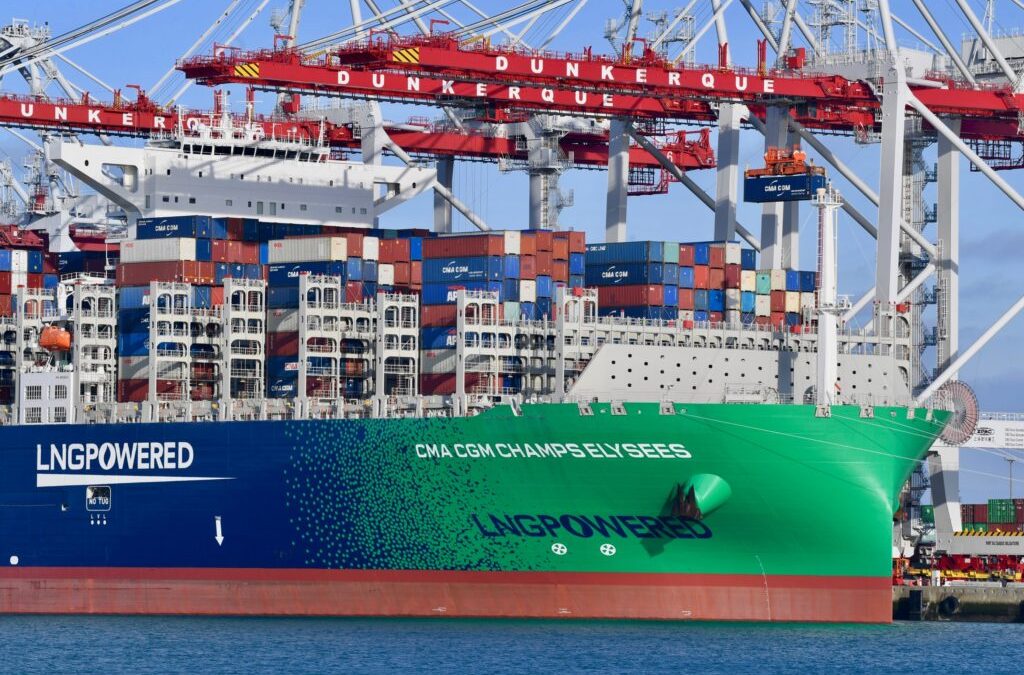French shipping and logistics giant CMA CGM is launching the first low-carbon shipping offer based on biomethane that supports the group vision to become carbon-neutral by 2050.
As of May 2021, the CMA CGM’s customers will be able to select biomethane via the Act with CMA CGM+ range of services, paving the way for a substantial reduction in the environmental impact of the shipping of their goods.
ACT with CMA CGM+ provides a full range of services designed to enable its clients to analyze, reduce and offset their environmental footprint.
Ahead of the UN Global Compact and as part of the first high-level preparatory talks for the COP26 summit, Rodolphe Saadé, Chairman and CEO of the CMA CGM Group has put forward solutions that are immediately available and bring the group a step closer to carbon neutrality.
CMA CGM has reached another milestone in its efforts to be carbon-neutral by 2050 by supporting the production of 12,000 tonnes of biomethane — equivalent to a year’s fuel consumption of two 1,400-TEU ships.
Biomethane is a renewable green gas produced in part by the methanation of European-sourced organic and plant waste. This energy source represents a fine example of how the circular economy can work while benefiting the agricultural sector.
As informed, CMA CGM intends to push ahead with the development of this energy source by investing in biomethane production facilities and studying the viability of liquefaction processes so that biomethane can be rolled out as a shipping fuel.
By supporting biomethane production, CMA CGM is accelerating its commitment to leading the energy transition in the shipping sector. The group cut its overall CO2 emissions by 4% in 2020, following a 6% reduction in 2019. Since 2008, the group has lowered its CO2 emissions per container-kilometer by 49%.
“We have crossed a new step with the launch of the first low-carbon shipping offer based on biomethane. We know that there is still a long way to go to meet the commitments of the Paris Agreement,” Saade commented.
“Achieving these goals do not rely on a single solution but on a set of initiatives and new technologies complimentary to each other.”
Biomethane and LNG
12,000 tonnes of guarantee-of-origin (GO) biomethane is enough to fuel the equivalent of two 1,400-TEU LNG-powered ships operating on the Northern European Balt3 line between St Petersburg and Rotterdam for a whole year, according to CMA CGM.
Guarantee-of-Origin Biomethane, coupled with CMA CGM’s dual-fuel gas-power technology, can reduce well-to-wake (entire value chain) greenhouse gas emissions (including CO2) by at least 67%. On a tank-to-wake basis (at ship level), the reduction in greenhouse gas emissions reaches 88% (including CO2).
CMA CGM harnesses the most effective technologies available to accelerate the energy transition in the shipping and logistics industry. As it stands, LNG is the optimum solution already available for reducing the carbon footprint of shipping and preserving air quality, the company claims.
It can reduce sulfur dioxide emissions by 99%, particulate matter emissions by 91% and nitrogen oxide emissions by 92%, going well beyond existing standards. By 2022, 32 of the group’s vessels will be LNG-powered.
The group is heavily investing in research and development alongside its industrial partners to identify the energy sources of the future with the aim of achieving a positive impact on our customers’ carbon footprint and helping to protect the environment.
Source: Offshore Energy






